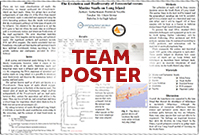
Team Info
- Program:
- Urban Barcode Research Project
- Year:
- 2023-24
- Research Topic:
- Wildlife & health
- Taxonomic Group Studied:
- Multiple - enter below
Project:
Role of Nitrate reducing Bacteria found in the Oral Cavity and Adolescents' dietary nitrate consumption
- Students:
- Faiza Soha, Chloe Cheng
- Institution:
- Brooklyn College, Brooklyn
- Mentors:
- Anjana Saxena
Abstract:
This study is focused on determining the abundance of nitrate-reducing bacteria in adolescents' oral cavities and its potential implications on cardiovascular health. Several studies have demonstrated that a nitrate-rich diet for humans is associated with many beneficial physiological systems in the body. Humans mainly obtain nitrate in the body through the consumption of green leafy vegetables and meat products. Oral commensal bacteria then convert nitrate to nitrite to produce salivary nitric oxide (NO) as an antimicrobial defense system. In this project we will determine the abundance of nitrate-reducing bacteria in saliva and assess their associations with three variables: age, gender, and ethnicity to understand their potential impact on cardiovascular disease. We anticipate that the data generated from this research will provide useful insights that can help link the dietary nitrate and oral microbiome to predict future health recommendations.

